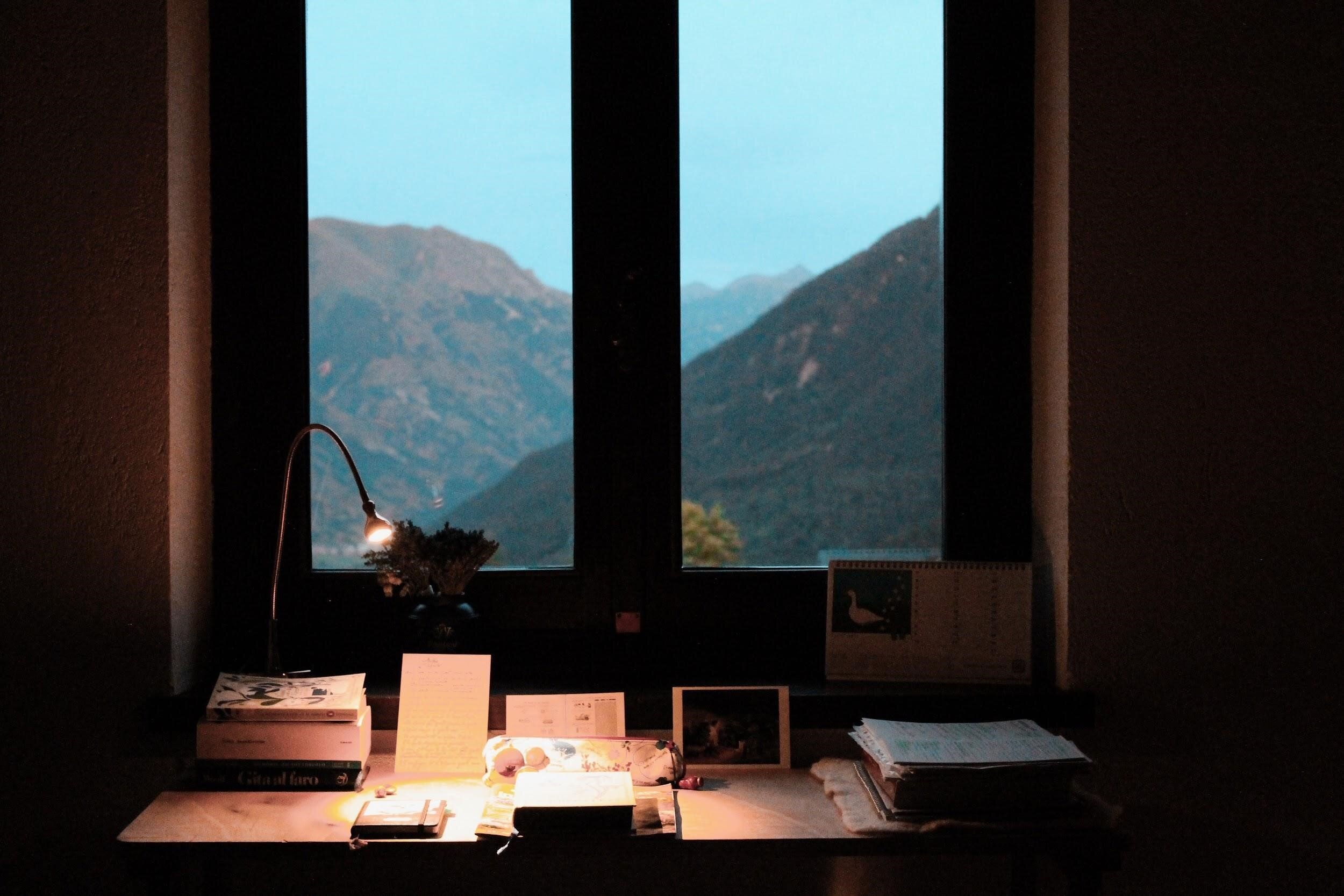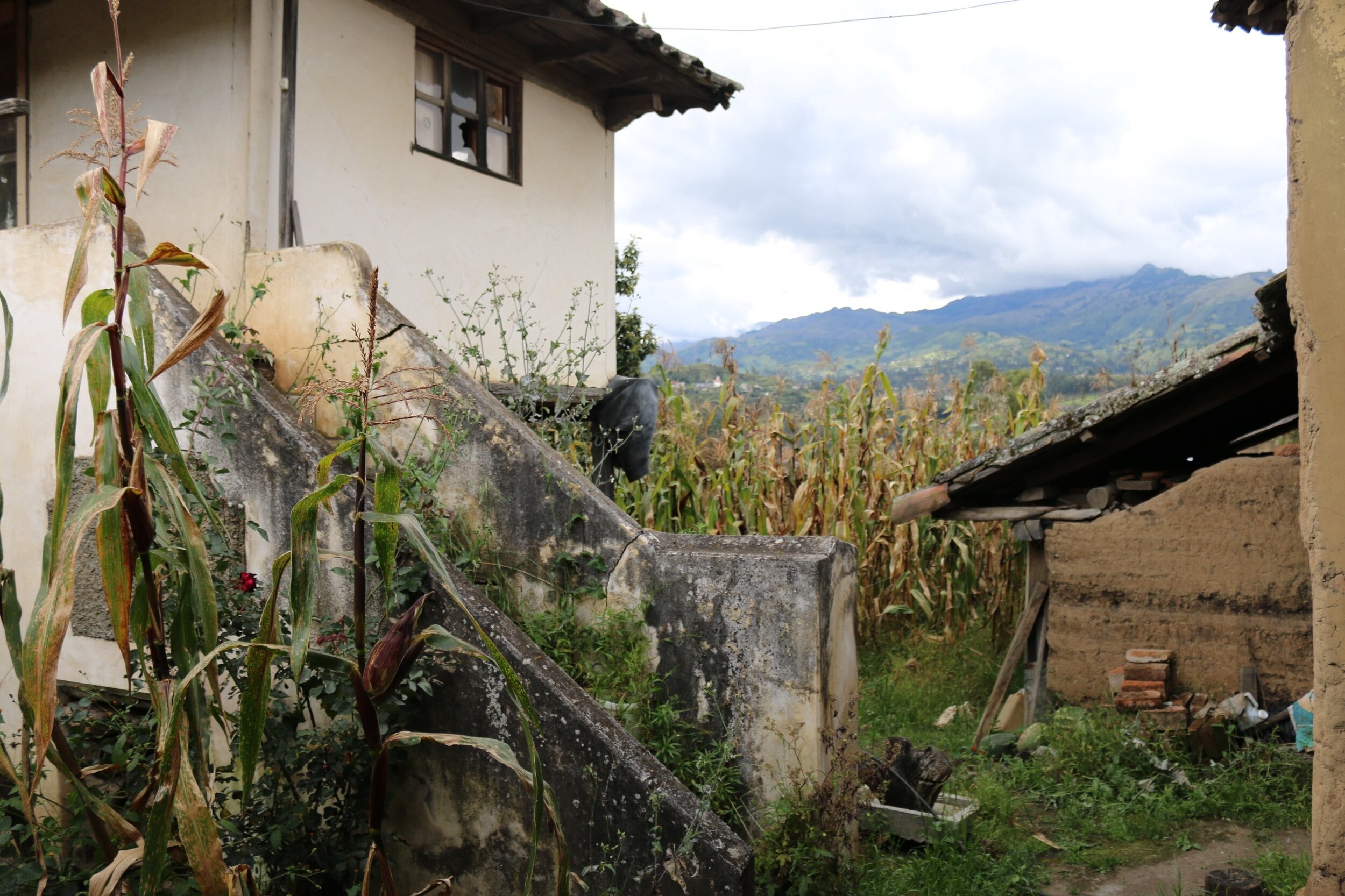In this blogpost, inspired by Carlin Zia’s March 5th OHMA presentation on her book “Uncertain Journeys,” Lisa R. Cohen reflects on the fluid nature of shared memories in different spaces - traveling back and forth between spoken, written, physical and even, increasingly, the virtual world.
Read MoreHug Your Plant! and Other Self-Care Tips for Oral Historians in Lockdown
A desk in front of a window. It’s sunset. The window looks out onto mountains. On the desk there are books, notebooks, postcards and a pencil case.
Photo Credit: Eleonora Anedda
Ted Kerr’s wise words inspired OHMA student Eleonora Anedda to reflect on the responsibilities of oral historians in times of crisis. Not so much on their duty towards others, but their obligations towards themselves. This piece will examine much needed self care habits that can be incorporated in our lockdown routines.
Read MoreUncovering Thyself: Identity Politics & Oral History
In this blog post, current OHMA student Marina Labarthe del Solar shares a conversation with Theodore Kerr about the importance of being transparent about your identity and positionality with the communities you work with. Marina writes about identity politics and how knowing where you stand with respect to power is an essential skill for oral historians.
Read MoreDialogue with Institutionalized Residents: Examples and Advice
Mt. Fuji in distance
(Photo: Sach Takayasu)
How do you engage in a dialogue with a narrator who lives permanently in an institution? Let me tell you a story.
Read MoreAI: An opportunity to reimagine an old-world anew
A black earbud case sits on a smartphone.
Photo by SCREEN POST on Unsplash
In this piece, Francine D. Spang-Willis reimagines a relationship with oral history and technology to create artificial intelligence that is more representative of and responsive to maintaining and perpetuating Indigenous language, knowledge, and culture. The piece is inspired by Stephanie Dinkins' Oral History as Told by AI presentation given on April 2, 2020.
Read MoreDecolonizing to Re-indigenize
Photo credit: Anahí Naranjo
An old home in a maize plantation outside of Guaranda, Ecuador. This is the home my mother grew up in.
Intro: Dr. Nēpia Mahuika’s September 26th workshop titled “Oral History and Indigenous Peoples: Rethinking Oral History, Methods, Politics and Theories” highlighted the intricate histories and traditions of indigenous communities that the academic field of oral history has begun to recognize. Dr., Mahuika is the author of soon to be published book Rethinking Oral History and Tradition from the Oxford University Press.
Read MoreGrant Me Serenity: A Case Study on How Alcoholics Anonymous Influences Life-History Storytelling
My father’s ten-year AA chip. It is a round gold coin with the words, “To thine own self be true,” around the edge. Inside is a large triangle with one word on each side. The words are: unity, service, recovery. In the center of the chip is a large X (Roman numeral 10).
Current OHMA student Lily Doron tries to understand how Alcoholics Anonymous, and 12-Step programs in general, train participants to reframe their life narratives in ways that promote healing, foster connection, and, hopefully, keep people sober. She brings these questions from OHMA’s workshop with Emma Courtland to an interview with her father, an alcoholic who is currently 12 years sober.
Read MoreImpediments
Samantha Greenspan discusses the power of words, the value of listening, and issues of legibility and marginalized languages. This blog post was inspired by Dr. Nēpia Mahuika’s workshop “Oral History and Indigenous Peoples: Rethinking Oral History, Methods, Politics and Theories.”
Read MoreWe Speak the Same Language, We See through Different Tongues
Credit to Imgur: https://imgur.com/gallery/ocClU
An image from the film The Arrival of the written language of an alien group—one that exists based on symbols and functions with regard to past, present, and future simultaneously. It resembles a black inkblot that swirls into a circle.
Languages don’t just dictate who we talk to, they shape the way we think. Current Columbia College student Amanda Ong considers the how the languages we speak mold the way we learn to see and navigate the world, even when we are not speaking them.
Read More“[unintelligible]” : (thoughts on intralingual subtitling)
In this post, filmmaker and current OHMA student Storm Garner discusses the practice of subtitling accented or non-normative spoken English in documentary filmmaking and video presentations of oral history.
Read MoreCreating Dynamic Dialogue with Our Past and Present: Reflections on ‘Below the Grid’ (Part II)
In this post, current OHMA student Xiaoyan Li (2016) reflects on how the dynamic dialogic process enlightens the shadows of our past and present.
This article is the second in a three-part series exploring Jack Kuo Wei Tchen’s recent OHMA Workshop Series lecture, “Below the Grid.”
Read More






